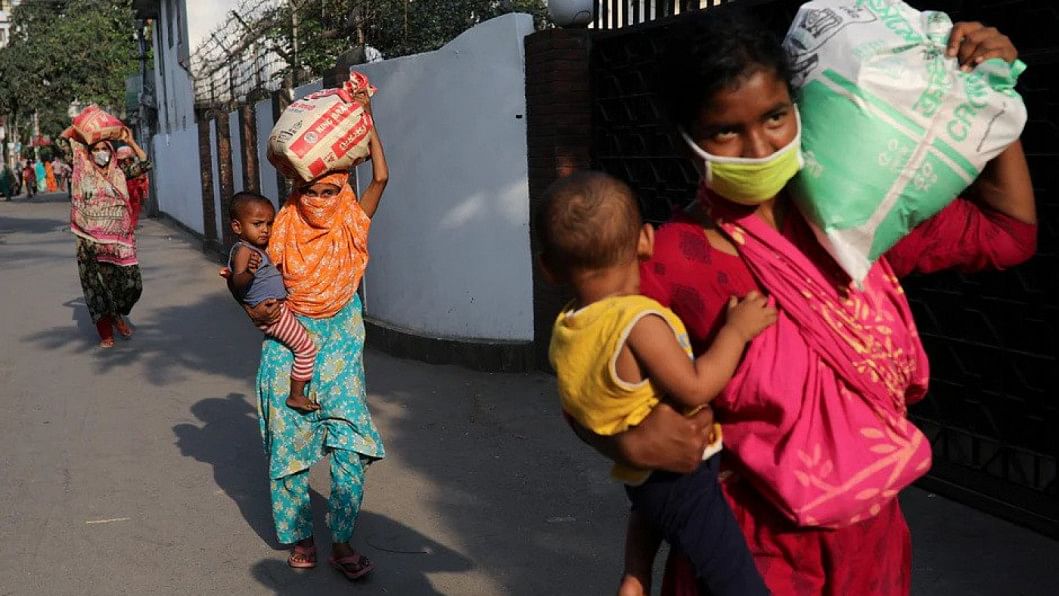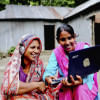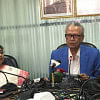Devaluing women's unpaid care work is costing us all

Lokkhi Rani from Satkhira spends her days taking care of her two daughters and carrying out household chores, with no time to find paid work. In addition to the unpaid care work, her chances of economic opportunities are further constrained by her limited education and the conservative social norms that constrain her choices. Lokkhi's life is shaped by decisions made by her husband and in-laws.
Care work constitutes the foundation on which our very existence depends. It includes activities people perform daily, including cooking, cleaning, and other household chores. It also includes direct face-to-face personal care activities such as nurturing the sick, feeding a baby, or teaching young children. Care work can be both paid and unpaid and performed in private households as well as in hospitals, nursing homes, schools, and other care establishments.
In general, many care activities are often unpaid and unrecognised, overwhelmingly done by women, leaving them with little time to pursue income opportunities.
The first-ever time-use survey, conducted by the Bangladesh Bureau of Statistics (BBS) in 2021, with support from UN Women, put a spotlight on the care economy of Bangladesh. The survey quantified how individuals spent or allocated their time in urban and rural areas across the country.
On average, women in Bangladesh spend about 25 percent of their time daily on unpaid care work while men spend 3.3 percent of their time on the same. This means that women carry out seven times more care work than men. Women's unpaid care work steadily increases with age, peaking at 6.2 hours for women aged 25-59 years, after which it reduces to 2.7 hours.
Comparatively, men's unpaid care work only marginally increases from 0.5 hours for the 15-24 years age group to 0.8 hours for the 25-59 years age bracket. Unpaid care work rates remain similar for women living in urban and rural areas, as well as for women with and without formal education. With marriage, women's load of unpaid care work increases by more than 151 percent, whereas men increase their employment-related activities by more than 78 percent after marriage.
The unequal distribution of unpaid care work was further exacerbated during the Covid-19 pandemic. According to the "Rapid Analysis of Care Work during COVID Pandemic in Bangladesh," women spent 28 percent more time on domestic duties than they did before the pandemic, with the burden increasing by about 40 percent for married women and adolescent girls, due to lockdowns and movement restrictions. Considering the data, it is no surprise that women's labour force participation is a low 36 percent compared to 80 percent for men.
Women's lack of time to participate in paid work constitutes a significant barrier to their access to income, which limits their autonomy and leadership. Women who are engaged in the formal labour force often end up working a "double shift" of paid and unpaid work. This has serious consequences for their health and well-being.
The disproportionate division of unpaid care work is not isolated to Bangladesh, though. The ILO's 2019 report, "Unpaid Care Work and the Labour Market," which analyses time-use surveys from across the world, highlighted that, without exception, women carry out 75 percent of unpaid care work (88 percent in Bangladesh). Moreover, ILO estimates that unpaid care work accounts for around nine percent of global GDP, approximately USD 11 trillion.
The gendered division of care and domestic responsibilities has cost implications for individuals, society, and the economy. In addition, given the common perception of "care" related work as primarily "women's work," there persists a strong cultural notion for an undervaluation of the work, which is also reflected in the wages and benefits offered to workers in the sector, especially to domestic workers.
At the global level, several initiatives are advancing the care agenda forward. As part of the 25-year review of the Beijing Platform for Action, the multigenerational campaign "Generation Equality" was launched, which demands equal pay and equal sharing of unpaid care work. Additionally, in response to the Covid-19 pandemic, ILO and UN Women launched a joint programme to support governments, women's organisations, development, and social partners globally in implementing gender-sensitive policy responses to the Covid-19 crisis and ensuring a job-rich and inclusive recovery.
In Bangladesh, the government's 8th Five-Year Plan commits to a comprehensive Gender Equality Strategy. The Plan aims to address the Sustainable Development Goal Indicator 5.4.1. (proportion of time spent on unpaid care and domestic work, by sex) and reduce the proportion of total time that women spend on unpaid domestic and care work from 25 percent to 20 percent, and increase the time that men spend from 3.3 percent to 10 percent by 2025. This will be achieved by investing in safety net programmes and conducive work environments, including strengthening the provision of medical and childcare support. Furthermore, the Women Development Policy (2011) emphasised the need to reflect women's household labour in the national accounts. In 2021, PM Sheikh Hasina pledged to raise women's participation in the workforce to 50 percent by 2041 in her address at the UNGA.
UN Women and ILO are committed to working with the Government of Bangladesh to accelerate women's economic empowerment via initiatives that address discriminatory social norms that perpetuate the unequal care work burden and create political consensus for the adoption of macro-level economic policies in pursuit of gender-equitable growth.
This includes recognising, reducing, and redistributing unpaid care work, and rewarding and representing paid care by a) promoting decent work for care workers, including through job creation for women, and promotion of sectoral and industrial policies that tackle occupational and sectoral segregation, b) supporting health protection for pregnant and nursing women to protect their right to a safe and healthy working environment, c) supporting parental leave provisions as a universal human and labour right, for both men and women, d) advancing care workers' representation by promoting social dialogue and collective bargaining, and e) promoting the right to childcare and long-term care services and ensuring that investments in care service provisions are costed, financed, and implemented through policy advice, capacity development, and technical support.
As reiterated by the UN Secretary General, António Guterres, we must invest in quality jobs in the care economy that will promote greater equality and ensure everyone receives the dignified care they deserve.
Gitanjali Singh is country representative for UN Women Bangladesh. Tuomo Poutiainen is country director of the International Labour Organization (ILO) Bangladesh.



 For all latest news, follow The Daily Star's Google News channel.
For all latest news, follow The Daily Star's Google News channel. 













Comments